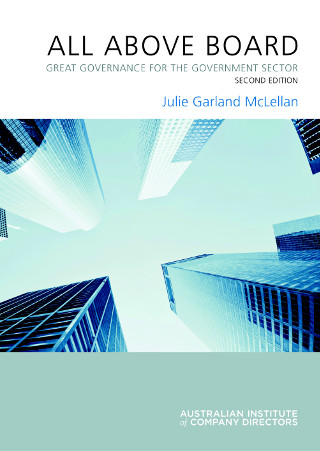|
|
|
|
|
|
|
|
|
Dear reader,
Welcome to the July 2019 edition of The Director’s Dilemma.
These dilemmas are based on real events that have occurred during my twenty years’ experience serving on and consulting to boards. This month our dilemma is based upon the true case of a government-owned company that discovered an unexpected complication arising from a diverse board. Not all dilemmas arise because something is wrong; we sometimes have to make unprecedented decisions when things go right!
I hope that you will empathise with our protagonist and enjoy the insights from our three contributors.
To read this email in a browser, go to www.mclellan.com.au/newsletter.html and click on 'read the latest issue'. I hope you enjoy thinking about the governance and strategic implications of the latest dilemma:
 Marnie chairs a large government-owned utility. Her board is great; each director has a unique skill-set that is relevant to the organisation's needs. Like many government boards, Marnie's board is younger than the norm and her directors are all full time employed. The board benefits from their current expertise and contacts. Management are particularly pleased to have access to their skills and insights. Marnie chairs a large government-owned utility. Her board is great; each director has a unique skill-set that is relevant to the organisation's needs. Like many government boards, Marnie's board is younger than the norm and her directors are all full time employed. The board benefits from their current expertise and contacts. Management are particularly pleased to have access to their skills and insights.
At the last meeting one of the directors announced that she was pregnant. This is great and happy news. It is also totally unprecedented and not covered in the enabling legislation, or any literature about human resource management, which assumes people are employed, or company director practices, which do not appear to have considered the possibility of a pregnant director.
Marnie wants to do the right thing and is confident that the government will support her chosen course of action once she has developed it. Marnie's aims are to provide certainty and security for the pregnant director whilst ensuring that the board continues to access the necessary skills and, importantly, maintains a quorum. Quorum is sometimes difficult as directors have travel commitments so losing a director for a year is going to be difficult to manage.
What can Marnie do?
|
|
|
|
Kevin's Answer
 There are many circumstances when Directors may need to take a leave of absence from a Board (e.g. maternity-also likely to increase with greater diversity on boards, illness, accident, and family or business circumstances). This is not an unusual occurrence and should not be addressed as such. Boards must be adaptable to these situations by being of an appropriate size; and having multiple Directors with the necessary skills and experience to govern and provide oversight. This also allows for healthy debate on issues between Directors with similar skill sets.
There are many circumstances when Directors may need to take a leave of absence from a Board (e.g. maternity-also likely to increase with greater diversity on boards, illness, accident, and family or business circumstances). This is not an unusual occurrence and should not be addressed as such. Boards must be adaptable to these situations by being of an appropriate size; and having multiple Directors with the necessary skills and experience to govern and provide oversight. This also allows for healthy debate on issues between Directors with similar skill sets.
In Marnie's situation she Chairs a small board (quorum challenge) of younger, experienced and fully-employed Directors (possible diversity challenge). The medium/long term objective should be to right-size the Board and address the possible lack of diversity. In the short-term Marnie may wish to consider:
1. Clearly identifying the skill gap(s) on the Board with the loss of the Director
2. Retaining independent professional advisors as appropriate
3. Reappointment by the Board of a previous well-respected Board Member until the next AGM* Continuity within the Board and knowledge of the organization is important. Pro tem appointments by Directors are often allowed with conditions
4. Appointment by the Board of an over-qualified individual (it's not a development position) who can cover the skill / experience gaps in the Board by serving as a Director until the next AGM*
5. Communicate the challenges to the Government to seek a medium / long term solution.
* or beyond if appropriate and as approved by shareholders
Kevin Hall is a member of three boards and an advisory board. He is also the Managing Partner of AltoPartners Canada and is based in Calgary, Canada.
|
|
|
|
Julie's Answer
 Marnie should ask the Minister to appoint an alternate director. She must arrange insurance, deed of access and indemnity, induction, etc. for the alternate and notify the insurer that the 'normal director' is on maternity leave. Marnie should ask the Minister to appoint an alternate director. She must arrange insurance, deed of access and indemnity, induction, etc. for the alternate and notify the insurer that the 'normal director' is on maternity leave.
Marnie will need a letter of appointment, declaration of conflicts, and consent to act. She should verify with the Minister's office that the 'on leave director' just returns from leave with no need for reappointment and no change to tenure (i.e. if she was appointed a year ago for three years, takes a year of maternity leave she comes back to serve a year then stands for re-election as if she had served all the way through).
Provide both the 'on leave' and 'alternate' directors with letters of leave authorisation and appointment to make intentions clear.
The 'on leave director' is still a director but is excused duties because the alternate is doing them. Alternates act in their own right; independent of instruction from the 'on leave director' they stand in for. Alternate directors have the same rights, powers, duties and responsibilities as other directors. Specific roles, duties and responsibilities, plus the period of appointment of the alternate director may be specified in the letter of appointment. Appointing an alternate allows directors to fulfil their duties and responsibilities if they will be absent for one or more board meetings, Section 201K of the Corporations Act is a good reference. ASIC must be notified within 28 days of the appointment and its cessation.
Marnie should invite the alternate to attend as an observer for a meeting with the departing director at the start of the leave to help get them up to speed.
Julie Garland McLellan is a non-executive director and board consultant based in Sydney, Australia.
|
|
|
|
Greg's Answer
 What a great dilemma to have! Firstly, the Board and Chair are delighted with the director's news, and having no precedents, have committed to work with her to find the best way forward. What a great dilemma to have! Firstly, the Board and Chair are delighted with the director's news, and having no precedents, have committed to work with her to find the best way forward.
Marnie is not only mindful of legal requirements; she and the other members of the board are also mindful of the pressures brought by being a director of a large government-owned utility. They are concerned to ensure "their" director is supported fully as she transitions into maternity leave; that she does not feel discarded or ignored during her time away nor feel that she needs to read everything and shadow everything that is going on; and finally that the transition back is smooth and painless. How to strike the right balance?
Marnie discusses with her director the possibility of appointing an "alternate director", ideally someone whose skills will re-complete the overall board competency set. Knowing that her director is a bit of a workaholic, Marnie suggests that since all of the board material is kept on the central servers where her director always has access, that deliberately no emails will be sent on board matters. There would be no expectation for her to read anything until the transition back to the role commences. Indeed the "alternate" director will be acting in their own right until the "normal" director returns. Her director agrees that this could be a good way forward.
In finding the "right" alternate director; Marnie is mindful that this would be a Ministerial appointment. The ideal person would be someone who already knows the organisation and its current and future challenges; is capable of being of independent mind and is not a "political appointee". This, Marnie discusses with the Minister who with a wry smile, agrees. A shortlist comprising a former deputy secretary to the department; an academic industry expert and a current director from a non-competing similar but out of state utility. This list Marnie will be discussed with the full Board at an out of session meeting and a recommendation made to the Minister.
Greg Bourne is a consultant and the former chair of ARENA and Non-executive director of Carnegie Wave Energy. He is based in Sydney, Australia.
|
|
|
|
Book review - All Above Board; Great governance for the government sector.

I wrote this book when I had served on three government-owned company boards and realised that there just was no specific practical reference guide to help directors grappling with the nuances and differences of the sector.
Stories and case studies bring the material to life; no surprise there!
46 real life examples of good practice that can be followed.
You don't have to start at the beginning and read to the end: The index is useful and well-compiled. It makes the book a handy companion for easy reference.
The book is now in its second edition and has also been translated into Mandarin for directors who prefer to read in that language.
Serving on a government board can be a great way to contribute to society, earn a living, and advance your director career (well, maybe not earn a complete living; perhaps avoid starvation instead).
Governance with a single shareholder is subtly different from that with multiple diverse shareholders; this is especially true if the business is in a sensitive portfolio area (and most government boards are).
Above all else, they are places where directors resolve dilemmas and build great companies. This book is for you if you want to do that.
Available in soft or paperback format through the Australian Institute of Company Directors.
Julie's news - In June
 I had a busy month of June with the usual slew of board meetings prior to the year end, a lovely selection of client workshops including not-for-profit and listed boards, several trips to Canberra (so bracing at this time of year), a dilemma workshop for Gordon Directors Group, a webinar on governance evolution or revolution for Better Boards, and delivery of a Keynote address at a Directors' Congress. Add to that some writing time, a board performance review, being interviewed by ABC News The Business, and development of a new online course; I was happily busy until it was time to write these words. I had a busy month of June with the usual slew of board meetings prior to the year end, a lovely selection of client workshops including not-for-profit and listed boards, several trips to Canberra (so bracing at this time of year), a dilemma workshop for Gordon Directors Group, a webinar on governance evolution or revolution for Better Boards, and delivery of a Keynote address at a Directors' Congress. Add to that some writing time, a board performance review, being interviewed by ABC News The Business, and development of a new online course; I was happily busy until it was time to write these words.
My podcast on Boardroom Bound is now online and I hope some of you will enjoy listening to it.
Next month will be a quieter time as the executives are all busy with year-end issues and directors can hope for some time to reflect on the year just passed.
I hope you will enjoy the respite before audit season catches up with us all and keeps us busy until the annual reporting season starts!
I am always keen to work more and will be delighted to hear from you if you would like to arrange a board strategy workshop, education session, or board performance review! Just call me on +61 411 262 470 or reply to this email for a discussion of how I might help your board.
Inspirational quote for July - This month my favourite quote is:

Excellent advice to which I would add "don't take governance advice from someone with no personal experience of serving on a board".
A note on names - A few readers have asked me where I find the names for the protagonists in each case study; I 'borrow' them from people I meet or things that I read. Marnie is the name of one of my favourite gym instructors. Her tireless endeavour to help everyone achieve their objectives would be great in a board chair (if she could sit still for long enough) and her care for her class participants is as high as the care that the real-life model for the protagonist in this case-study showed for his board when they needed to make arrangements to "boldly go where no man had been before". The name Marni originates from several languages, including Hebrew, meaning "rejoice", and has derivations from Gaelic and Swahili.
This newsletter - If you have any ideas for improving the newsletter please let me know. If you are reading a forwarded copy please visit my website and sign up for your own subscription.
Suggestions for dilemmas - Thank you to all the readers who have suggested dilemmas. They are greatly appreciated. I will answer them all eventually. I could not write this newsletter without your help and without the generous help of all the experts who respond each month to the case studies.
Be a contributor - If you would like to attempt a response to the dilemmas for publication you will be most welcome. Simply reply to this email and let me know.
Let's connect - I use LinkedIn to share information about boards and directorship with my friends and acquaintances. If you use LinkedIn and we are not yet connected I will welcome a connection from you. You can find me at linkedin.com/in/juliegarlandmclellan.
Let me help you - If you would like me to speak to or train your board, staff, audience and/or group please contact me at julie@mclellan.com.au.
Farewell until the next issue (due 1 August 2019). I look forward to greeting you again then. In the interim I hope you will enjoy health, happiness and hard work as well as a lovely holiday.
Enjoy governing your corporations; we are privileged to do what we do!
Best regards,
Julie
Photo Credits: Personal images in this newsletter are provided courtesy of the contributors, course attendees and conference participants. Main photo courtesy of Shutterstock.com.
Disclaimer: The opinions expressed above are general in nature and are designed to help you to develop your judgement as a director. They are not a definitive legal ruling and do not constitute legal advice. Names and some circumstances in the case study have been changed to ensure anonymity. Contributors to this newsletter comment in the context of their own jurisdiction; readers should check their local laws and regulations as they may be very different.
Privacy: I am privileged to have your contact details and keep them as safely as possible. I will alert you if they are ever accessed by any unauthorised person (the technical staff at ayuda help with publishing and issuing the Director's Dilemma and have access so they can send the newsletters to you). I do not sell your details to anyone; they are kept only for the intended purpose - sending you this newsletter and helping to build the judgement of company directors by providing a safe way to consider potential responses to real life events.
|
|
|
|
|
|
|
|
|
|
|
|
|
 Marnie chairs a large government-owned utility. Her board is great; each director has a unique skill-set that is relevant to the organisation's needs. Like many government boards, Marnie's board is younger than the norm and her directors are all full time employed. The board benefits from their current expertise and contacts. Management are particularly pleased to have access to their skills and insights.
Marnie chairs a large government-owned utility. Her board is great; each director has a unique skill-set that is relevant to the organisation's needs. Like many government boards, Marnie's board is younger than the norm and her directors are all full time employed. The board benefits from their current expertise and contacts. Management are particularly pleased to have access to their skills and insights.
 There are many circumstances when Directors may need to take a leave of absence from a Board (e.g. maternity-also likely to increase with greater diversity on boards, illness, accident, and family or business circumstances). This is not an unusual occurrence and should not be addressed as such. Boards must be adaptable to these situations by being of an appropriate size; and having multiple Directors with the necessary skills and experience to govern and provide oversight. This also allows for healthy debate on issues between Directors with similar skill sets.
There are many circumstances when Directors may need to take a leave of absence from a Board (e.g. maternity-also likely to increase with greater diversity on boards, illness, accident, and family or business circumstances). This is not an unusual occurrence and should not be addressed as such. Boards must be adaptable to these situations by being of an appropriate size; and having multiple Directors with the necessary skills and experience to govern and provide oversight. This also allows for healthy debate on issues between Directors with similar skill sets. Marnie should ask the Minister to appoint an alternate director. She must arrange insurance, deed of access and indemnity, induction, etc. for the alternate and notify the insurer that the 'normal director' is on maternity leave.
Marnie should ask the Minister to appoint an alternate director. She must arrange insurance, deed of access and indemnity, induction, etc. for the alternate and notify the insurer that the 'normal director' is on maternity leave. What a great dilemma to have! Firstly, the Board and Chair are delighted with the director's news, and having no precedents, have committed to work with her to find the best way forward.
What a great dilemma to have! Firstly, the Board and Chair are delighted with the director's news, and having no precedents, have committed to work with her to find the best way forward.
 I had a busy month of June with the usual slew of board meetings prior to the year end, a lovely selection of client workshops including not-for-profit and listed boards, several trips to Canberra (so bracing at this time of year), a dilemma workshop for Gordon Directors Group, a webinar on governance evolution or revolution for Better Boards, and delivery of a Keynote address at a Directors' Congress. Add to that some writing time, a board performance review, being interviewed by ABC News The Business, and development of a new online course; I was happily busy until it was time to write these words.
I had a busy month of June with the usual slew of board meetings prior to the year end, a lovely selection of client workshops including not-for-profit and listed boards, several trips to Canberra (so bracing at this time of year), a dilemma workshop for Gordon Directors Group, a webinar on governance evolution or revolution for Better Boards, and delivery of a Keynote address at a Directors' Congress. Add to that some writing time, a board performance review, being interviewed by ABC News The Business, and development of a new online course; I was happily busy until it was time to write these words.
